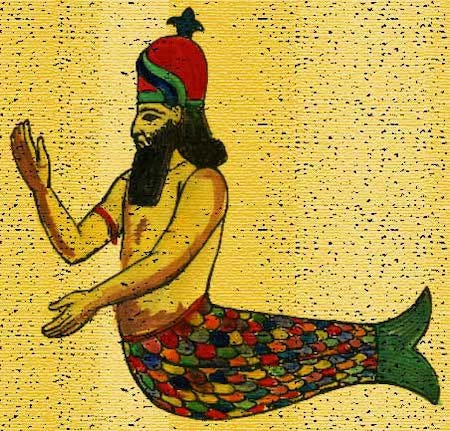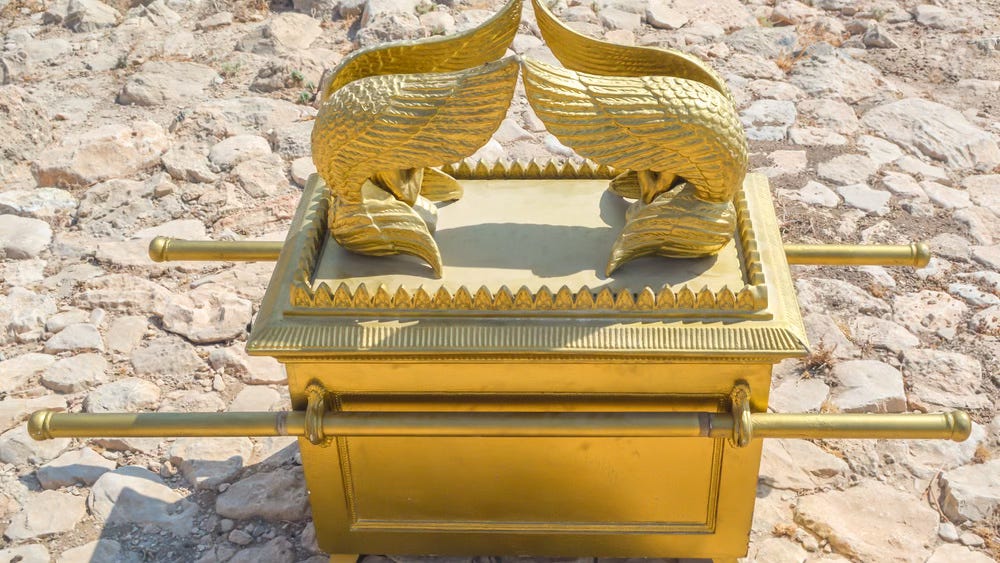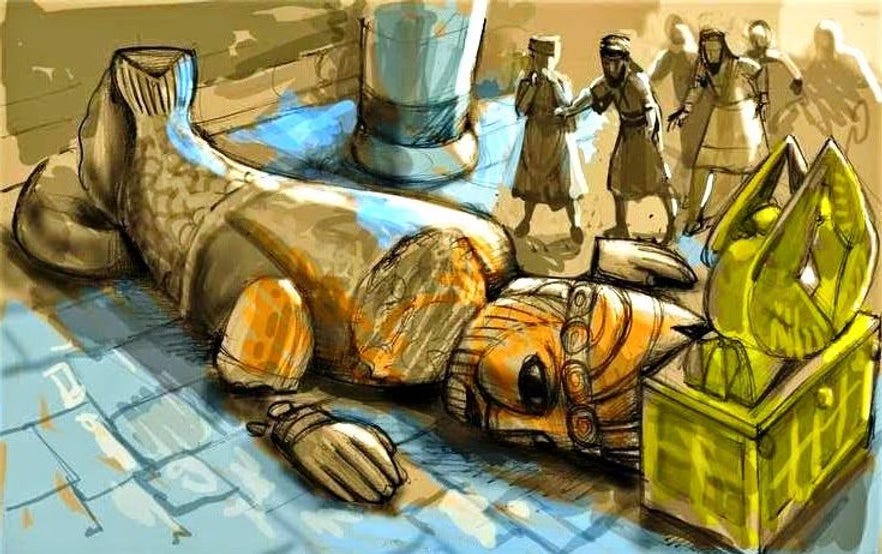A couple of years ago, I set out on a journey. The initial purpose of this journey was Bonding with Husband. He has a love of all things Marvel. So, I’ll admit it: I’ve watched every Marvel movie made. From Guardians of the Galaxy to Iron Man (all of them) to Black Widow…I’ve seen it all. I’ve liked most of them. I’ve even cried at some of them. (Don’t mention that to anyone…)
Through this journey, I’ve learned that there’s a powerful force inside of us that longs for a hero. What else could explain the ease with which we believe in a world where people with supernatural powers and abilities exist? My trek through the Marvel universe has helped me better understand the hearts of those ancient people groups we see in Scripture, as they too sought heroes in their culture.
Today we’ll look at the god of the Philistines. Tell me if you think this guy would fit right in with the Marvel series.
Meet Dagon: Fish Man
Seriously, though…Does this image bring back memories of Ariel’s father, King Titan? What about Aquaman? Anyone….?
Dagon was the chief deity of the Philistines, a group of Canaanites who settled along the coast of the Promised Land. According to ancient mythology, Dagon is the father of Baal. So, at least we’re keeping with the idol family tree.
Based on the images and statues found of this god, you would think that he was considered to be the god of the sea or fish. For many years, scholars believed this, too. Actually, recent scholarship has agreed that Dagon is more commonly associated with the god of grain, the god of fertility (just like Baal and Asherah), and the god of anointing kings.
Epic Showdown
The longest narrative about Dagon in Scripture appears in 1 Samuel 5. Let’s set the stage.
In the days before the Temple, God’s Presence rested on the Ark of the Covenant in the portable tent, the Tabernacle. Now, during this period of history, God’s people were at war with the Philistines. And their leader, Eli the High Priest, was not doing a stellar job of leading. He allowed his two, grown adult sons to run wild. They were getting fat on the meat people offered for sacrifice. They were soliciting prostitutes right outside the doors of the Tabernacle. Their blatant violation of Yahweh’s covenant set the tone for His people. The people were not faithful to God.
In 1 Samuel 4, Israel goes out to battle the Philistines and lose…horrifically. They lose around four thousand men (vs. 2). So the elders gather together and come up with a plan:
“Why has the Lord defeated us today before the Philistines? Let us bring the ark of the covenant of the Lord here from Shiloh, that it may come among us and save us from the power of the enemies.”
-1 Samuel 4:3
Great idea! Let’s use the Ark of the Covenant as a good luck charm! Let’s force God to fight for us! That’ll work.
So the Philistines fought, and Israel was defeated, and they fled, every man to his home, and there was a very great slaughter, and there fell Israel thirty thousand foot soldiers. And the ark of God was captured…
-1 Samuel 4: 10-11
Well, darn. That backfired.
The practice of capturing the enemy’s god in battle was common in ancient Near East warfare. It was understood that a people group was completely conquered if their god was captured. In the eyes of the Philistines, Dagon reigned supreme.
Surprise!
The Philistines took the ark and placed it in their holy shrine next to Dagon. Very satisfied with themselves, they went to sleep that night and slept like babies. The next day, they were in for a surprise:
And when the people of Ashdod rose early the next day, behold, Dagon had fallen face downward on the ground before the ark of the Lord. So they took Dagon and put him back in his place.
-1 Samuel 5:3
Whoops! What do you think the Philistines said to themselves? “Well, shoot, Dagon’s mer-man tail wasn’t angled just right…Someone get Harry and Bill in here so we can haul our god back in place!”
I don’t think they yet believed Dagon’s fall had anything to do with God’s presence. So, God had to make things clear:
But when they rose early on the next morning, behold, Dagon had fallen face downward on the ground before the ark of the Lord, and the head of Dagon and both his hands were lying cut off on the threshold. Only the trunk of Dagon was left to him.
-1 Samuel 5:4
Well, that’s clarifying.
Dagon, now headless and handless, bows helpless to the God of the Universe. The Philistines were terrified. They spent the next seven months passing around the ark because every town they tried to stash it, the people developed tumors all over their bodies. They eventually sent the ark back to Israel, admitting defeat.
The message was clear: Yahweh reigns supreme. He fights the battles. We can’t use Him (or any god of our own creation) to manipulate our circumstances or exert power over anyone. We were made to bow before Him.
Our God doesn’t just defeat our enemies. He defeats the enemy of sin inside of His people. Unlike these useless and worthless statues, He sacrifices Himself to do this work.








Such an important point: we so often try to turn the Lord into our good luck charm and make him wage war for us. So many connections to our modern day interpretation of what Christ’s posture is towards culture and therefore what the church’s posture should also be. We keep trying to make him into the Messiah that brings his earthly kingdom now—to remake him in our image/the image of our idols. He will resist us every time.